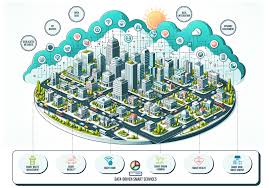The global mining industry is at a pivotal juncture, with a growing imperative to transform its approach to waste management. The year 2025 marks a critical period where “smart solutions” are emerging as the cornerstone for mitigating environmental impact and fostering sustainable practices. This shift is not merely an operational adjustment but a strategic evolution, crucial for building zero net carbon, eco-friendly, and equitable cities by addressing the vast legacy and ongoing generation of mining waste through innovative technological and systemic interventions.
Historically, mining waste, particularly tailings and overburden, has posed significant environmental and social challenges. Vast impoundments of tailings often contain hazardous residues, risking groundwater contamination, soil degradation, and air pollution from dust. The sheer volume of this waste consumes enormous land areas, impacting biodiversity and often encroaching upon or displacing local communities. Traditional disposal methods contribute substantially to the industry’s carbon footprint, making a fundamental change in waste management practices indispensable for any credible commitment to a sustainable future.
The advent of “smart solutions” is now revolutionising this landscape. Leveraging advancements in artificial intelligence (AI), the Internet of Things (IoT), and advanced analytics, mining operations are increasingly able to monitor waste streams in real-time, predict potential environmental risks, and optimise processing for resource recovery. Technologies such as automated sorting, remote sensing, and advanced mineral processing techniques are enabling the extraction of residual valuable minerals from waste, turning what was once a liability into a potential asset. This transition towards a circular economy model for mining waste represents a significant leap forward in resource efficiency.
The environmental benefits of these smart solutions are manifold. By reducing the volume of waste requiring long-term storage, the demand for new land for tailings dams is curtailed, preserving natural ecosystems and biodiversity. The recovery of critical minerals from waste streams lessens the need for virgin extraction, thereby reducing the overall environmental footprint of mining. Furthermore, advanced processing techniques can neutralise hazardous components, preventing long-term pollution of water bodies and soil. This proactive approach to waste minimisation and valorisation is directly contributing to the aspirations of zero net carbon cities by reducing energy consumption associated with new extraction and processing.
Beyond the environmental dividends, the shift towards sustainable mining waste management carries profound social and economic implications. Communities traditionally affected by mining activities stand to benefit from cleaner environments, reduced health risks, and improved land availability. The development and deployment of these smart solutions are also fostering new industries and creating green jobs, offering retraining and employment opportunities for local populations. This contributes to more equitable development outcomes, ensuring that the benefits of technological advancement are shared broadly and inclusively, enhancing social licence to operate for the mining sector.
For these smart solutions to achieve their full potential, supportive policy frameworks, robust regulatory oversight, and sustained investment in research and development are paramount. International collaboration and knowledge sharing will accelerate the adoption of best practices globally. As urbanisation continues its relentless pace, the responsible management of raw material supply chains, starting from the source of extraction and waste generation, becomes an integral part of building truly sustainable, resilient, and liveable cities. The ongoing innovations in mining waste management are not just about cleaning up the past, but about forging a more responsible and resource-efficient future for the planet and its inhabitants.
Also Read: Kolkata’s Rajpur‑Sonarpur Residents Protest Broken Roads Stalled Drainage Projects


